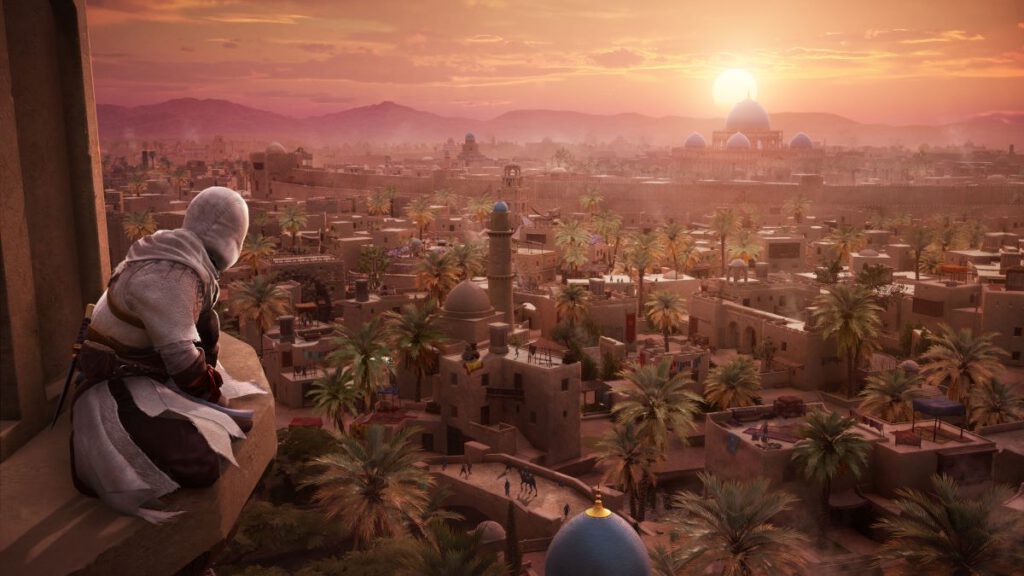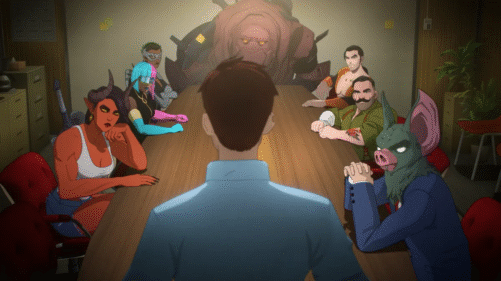Readers of this site may be more familiar with the Michael Fassbender film version of “Assassin’s Creed”—one of the worst video game adaptations of all time—than the franchise it so pitifully adapted. It’s arguably the least representative film adaptation of the franchise’s potential on which it’s based in that “AC” is a series of limitless ideas, stories told throughout history without geographical restrictions—the kind of thing that’s impossible to capture in a single movie. For 16 years, “Assassin’s Creed” has been transporting gamers through history, sorta telling an elaborate long story about the history of the Order of Assassins, although that interconnecting thread has been somewhat lost over the years (or at least I’ve lost it personally). For the most part, each “AC” jumps to a different time period with a different protagonist, and it’s the mechanics that tie the games together with a focus on stealth, exploration, and refined combat.
Some of the best installments have taken place on the high seas (“Black Flag”), in Ancient Egypt (“Origins”), and in the time of the Vikings (“Valhalla”). It’s been a long stretch since the last game—especially given there used to be an “AC” every year—and the new “Mirage” started life as an expansion for “Valhalla,” telling more of the story of Basim Ibn Ishaq, who was introduced in the back half of that game. Much smaller than recent “AC” experiences and a conscious throwback to the simple structures of the original games, it’s hard to shake the feeling that “Mirage” is a bit of an afterthought. The story is too inconsequential, and the gameplay too repetitious. However, when it’s working on its simple terms, it’s undeniably fun. There’s something almost refreshing about the lack of bells and whistles, returning a franchise that arguably got bloated back to its basics. And I hope that finding the beating heart of this franchise again will push the developers to find the perfect balance for the next game.

You play as Basim years before his appearance in “Valhalla.” He’s just a street thief in Baghdad when he gets sucked into the world of the Assassins, known here as the Hidden Ones. Basim becomes a key player in the fight against the Order of the Ancients, exploring the city to find allies, supplies, and information that will destroy their enemies. “Assassin’s Creed” has become known for massive open worlds, but “Mirage” takes place in a relatively small (though still pretty large for a game) Baghdad that’s been divided into four districts. It’s comparable to the Paris of “Unity,” a place with many nooks and crannies but not the overwhelming world of recent installments.
As for gameplay, “Mirage” has a traditional balance of stealth, exploration, and combat. You have a sword and a dagger—both of which can be swapped out for a few variations with different perks and upgraded slightly—and melee combat consists of parrying certain moves and dodging other ones. Of course, it’s often advisable to keep Basim out of combat altogether, and “Mirage” does have a great deal of customization in terms of approach. Sneak past guards, assassinate them with your dagger, or even drop something on their heads. You also have two informational tools that come in handy—Eagle Vision can point out key elements in the environment, like doors and guards, while Enkidu is an owl who can scope the scene from above (if there isn’t an annoying marksman to take them down).
All of these ingredients combine in what are basically mini-games wherein Basim has to get someone or something from behind enemy lines, and it’s up to the gamer to find the best approach to accomplish the mission. An undeniable repetition creeps into “Mirage” that’s the game’s biggest weakness—outside of the general low stakes of the storytelling. Role-playing and open-world games are inherently repetitious, but the best “AC” games can mix it up more in each mission, slightly shifting or bending the rules to keep it fresh or giving the gamer new inventory or skills. The RPG elements here are incredibly slight, with a small skill tree and limited inventories/resources. That’s fine, but why make a game where you are constantly hunting for treasure if none of that treasure matters beyond making your throwing knife a little stronger? I must have pickpocketed a hundred people before I realized it wasn’t having much impact on my game. There are too many elements like that in “Mirage”—gameplay mechanics that don’t have any weight.

Detractors of “Mirage” will also point to design elements that are underdeveloped. Love and care have gone into the creation of Baghdad, but being an “Assassin’s Creed” game, there are still times when everything looks the same, and you’re climbing a wall you never meant to climb. The mechanics here feel clunkier than the last few, with a few more outright glitches—an enemy just yesterday fell through the floor as I tried to kill him—although those could be patched soon. Small worlds are one thing, but I often wanted the physics of this world to be more consistent and the enemies to be more varied—there are only a few variations, and you’ll learn their weaknesses quickly.
However, those who long for an old-fashioned “Assassin’s Creed” like the first three games they fell in love with over a decade ago are unlikely to care. “Mirage” is a throwback, a simple game in a time when so many of them have gotten bloated and over-complicated. Whereas the scope of something like “Valhalla” appeals to me more, there’s something admirable about returning to the drawing board and not just continuing with a bigger/stronger/more aesthetic with each game. I wish the storytelling didn’t lose the urgency by limiting the scope and that the missions contained more variance within that old-fashioned approach, but when you’re jumping off towers or sliding through enemies with your dagger out, it’s easy to remember why people fell in love with “Assassin’s Creed” in the first place.
Ultimately, it’s clear that “Assassin’s Creed” isn’t going anywhere, and that’s a good thing. It felt like an annual game was a bit much for the teams behind these titles and was actually exhausting, given the size of titles like “Valhalla” and “Odyssey.” Ideally, the folks at Ubisoft would alternate with the gigantic open-world experiences of most of the 2010s and something like this. Perhaps the best way to look at “Mirage” is as a reboot, a new launch for the next generation of “Assassin’s Creed,” one that will leave that Fassbender junk buried even deeper in our collective memory.
The publisher provided a review copy of this title.












